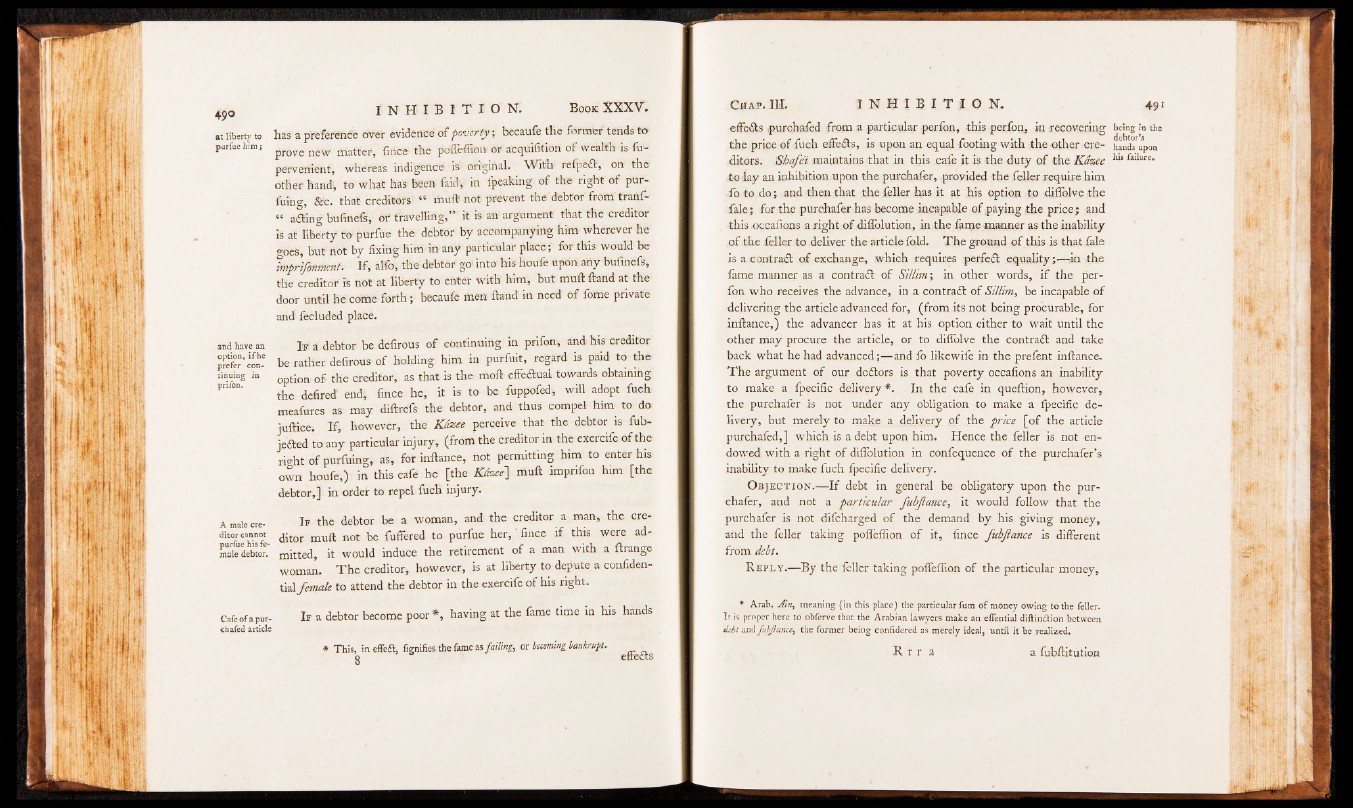
at liberty to
purfue him ;
and have an
option, i f he
prefer continuing
in
prifon.
A male creditor
cannot
purfue his female
debtor.
Gafe o f a pur-
chafed article
has a preference over evidence of poverty ; becaufe the former tends to
prove new matter, Since- the pofleffiöii1 or- acquisition of wealth is fu-
perven'ienf, whereas indigence h original. With reSpéâ, on the
other hand; to what has- b’eeri fairly in Speaking of the right of pur-
fuing, ffie. that- creditors' I muft not prevent the debtor from tranf-
“ aéïing bufinefs, or1 fraveffing,” it ils- ait argument that the Creditor
is at liberty to purfrie the debtor by accompanying him wherever he
goes, but riot by fixing him in-any particular placé ; fer this would be
imprifonment. If, alfo, thédébtor go» into' his houfe upon any bufmefs,
the creditor is not at liberty to enter w'ith him, but muft Stand at the
door until he come forth ; becaufe men Stand in need of feme private
and- Included place.
I f a debtor be defirous of continuing in prifon, and his creditor
be rather defirous of holding him in purfuit, regard is paid to the
option of the creditor, as that is the mod effectual towards obtaining
the defined' end, Since he, it is to be fuppofed, will adopt fuch
meafures as may diftrefs- the debtor, and thus compel him to do
juftice; If, however, the Kâzee perceive that the debtor is- fub-
jefted to any particular injury, (from the creditor in the exercife of the
rio-ht of purfuing, as, for inftance, not permitting him to enter his
own houfe,) in this café he [the Kâzee] muft impnfon him [the
debtor,] in order to repel fuch injury.
If the debtor be a woman, and the creditor a man, the creditor
muft not be fuffered to purfue her, ' fince if this were admitted,
it would induce the retirement of a man with a ftrange
woman. T h e creditor, however, is at liberty to depute a confidential
female to attend the debtor in the exercife of his right.
I f a debtor become poor * , having at the fame time in his hands
T h is , ine ffed t, lignifies the fame as f ilin g , m becoming bankrupt.
effefts
effefits purchafed -from a particular perfon, this perfon, in recovering being in the
the price of fuch effects, is upon an equal footing with the other ore- hands upon
ditors. Shafei maintains that in this cafe it is the duty of the Kazee hl8 failure*
to lay an inhibition upon the purchafer, provided the feller require him
lb to do; and then that the feller has it at his option to diflolve the
fale; for the purohafer has become incapable of paying the price ; and
this .occasions a right of diftolution, in the fame manner as the inability
of the feller to deliver the article fold. The ground of this is that fale
is a contrail of exchange, which requires perfect equality ;— in the
fame manner as a contrail of Sillim; in other words, i f the perfon
who receives the advance, in a contrail of Sillim, be incapable of
delivering the article advanced for, (fromits not being procurable, for
inftance,) the advancer has it at his option either to wait until the
other may procure the article, or to diflolve the contrail and take
back what he had advanced;— arid So likewife in the prefent inftance.
The argument of our doilors is that poverty occafions an inability
to make a fpecific delivery*. In the cafe in queftion, however,
the purchafer is not under any obligation to make a Specific delivery,
but merely to make a delivery of the price [of the article
purchafed,] which is a debt upon him. Hence the feller is not endowed
with a right o f diflolution in confequence of the purchafer’s
inability to make fuch fpecific delivery.
O b j e c t i o n .— I f debt in general be obligatory upon the purchafer,
and not a particular fubjlance, it would follow that the
purchafer is not difcharged of the demand by his giving money,
and the feller taking pofleflion of it, fince fubjlance is different
from debt.
R e p l y .— By the feller taking poffeffion of the particular money,
* Arab. A in , meaning (in this place) the particular fum o f m oney owing to the feller.
It is proper here to obferve that the Arabian lawyers make an eflential diftinfiion between
debt and fubjlance, -the former being confidered as merely ideal, until it be realized.
R r r ] a fubftitution